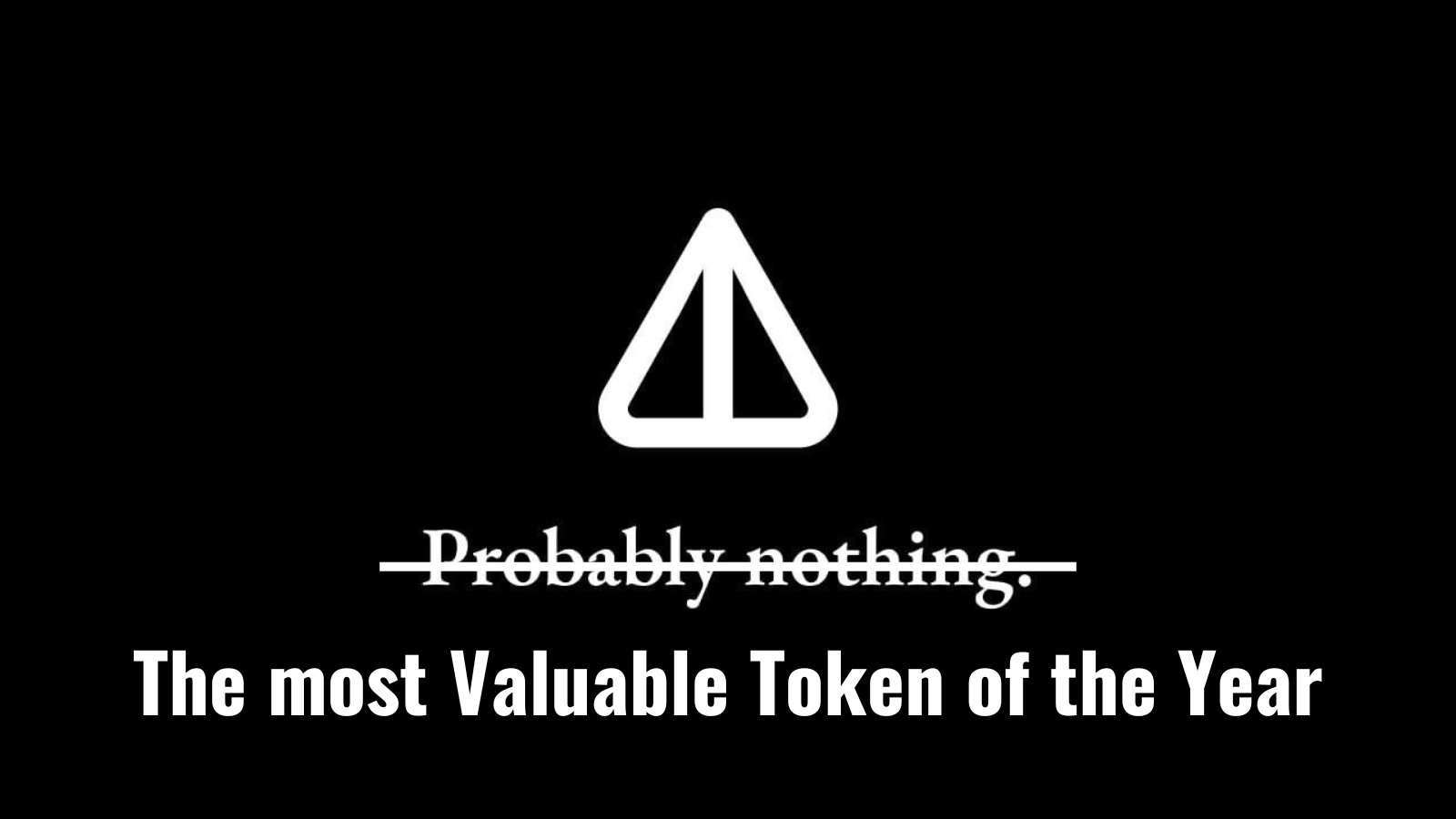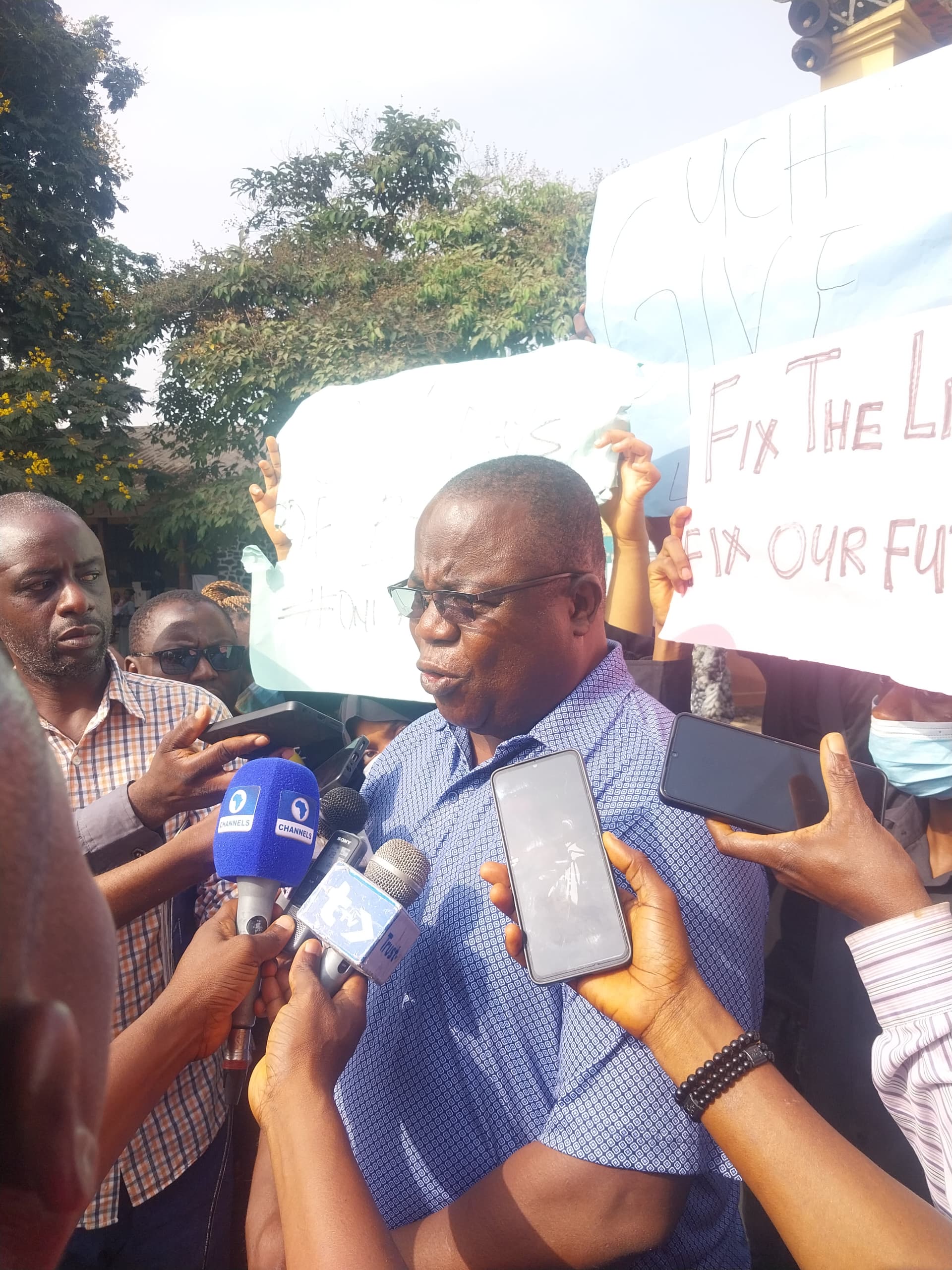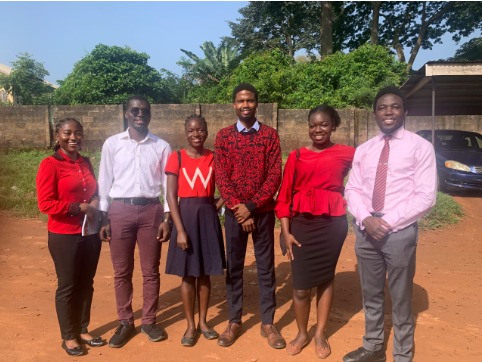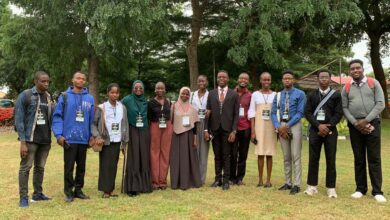#FeesMustFall Protesters: “The Last One Year has been Hell”
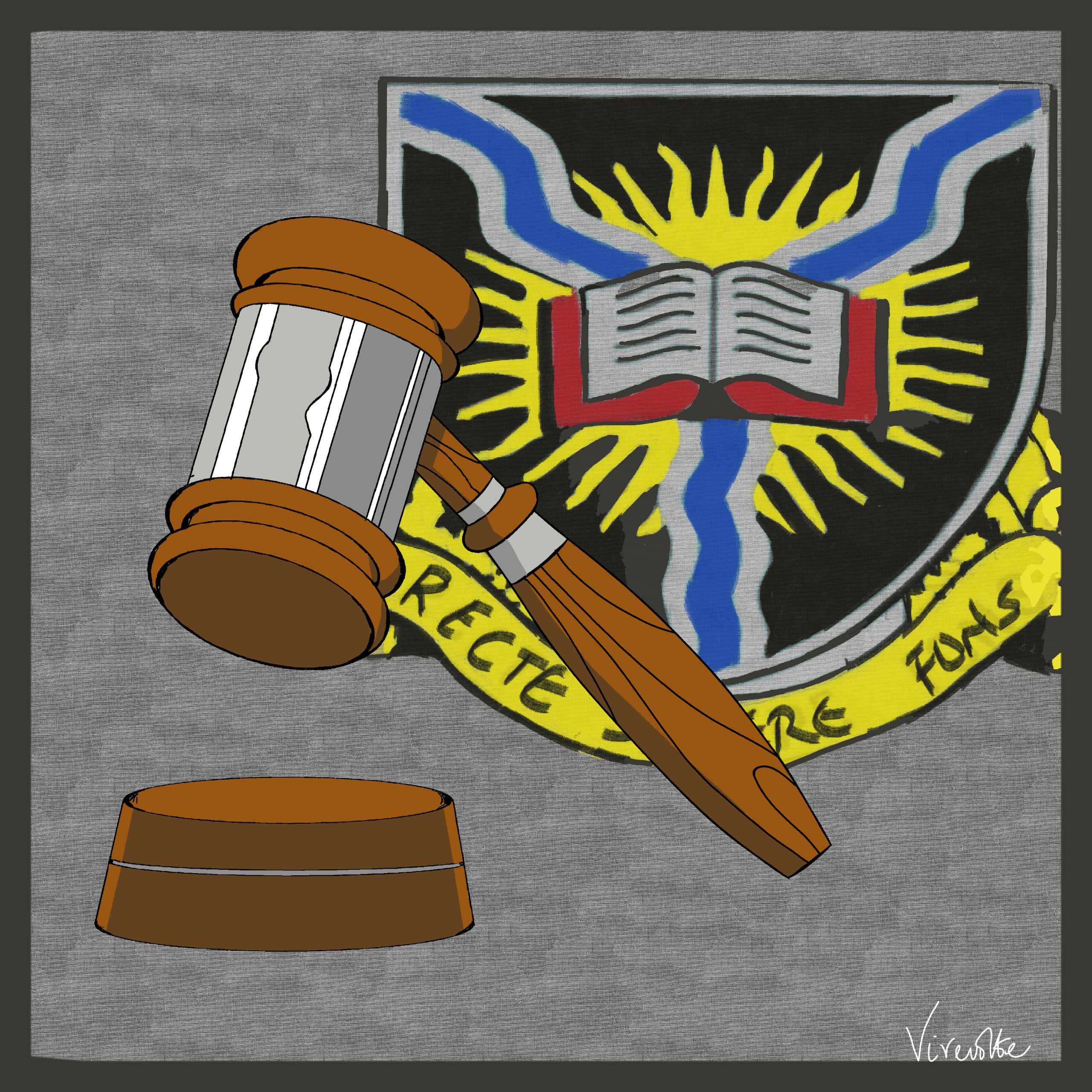
University of Ibadan fee-hike protesters, Aduwo Ayodele, Nice Linus and Olamide Gbadagesin, on the 11th of July, 2025, called a press conference to address the ongoing prosecution of the trio on the allegation of misconduct bordering on insubordination/ unruly behaviour, in relation to the May 13th 2024, protest staged during the inauguration of the Aweda-led Student Union Administration.
The History, Law and African Studies students, respectively, along with one Adeyeye Oluwafemi, a non-UIte, had at the time staged a peaceful protest at Trenchard Hall, where they carried placards bearing messages condemning the fee hike, before they were assaulted by Security forces and whisked out of Trenchard Hall. What has followed since has been a protracted saga, with the three appearing for the first time before the Student Disciplinary Committee for Jointly Committed Offences on July 2nd, 2024, and a year later, Ayodele and Gbadagesin alone facing the Student Disciplinary Committee for Jointly Committed Offences on the 30th of June, 2025. This process has now culminated in a summons to a Central Student Disciplinary Committee meeting slated for Monday, 14th July, 2025. The proceedings have since continued without Nice Linus, the 400L Law student, who is currently embroiled in a legal battle with the University Management over her disqualification as Obafemi Awolowo Hall Majority Leader at the Students’ Representative Council, a decision attributed to her pending disciplinary case but critically, not backed by existing legislation as according to Section 26 (5) of the UI Student Union Constitution, only students who have been found guilty of gross misconduct can be debarred from contesting a student union election. In conversation with UIMSA Press, the activist decried the persistent interference of the management in student affairs, stating, “Given the constant interference of the Management with matters of the Union, escalating from matters considered ‘minute’ to significant perpetration of injustice, it is necessary to address it legally. At the end of this process, my biggest hope and achievement would have been pulling down the veil covering students’ eyes of consciousness, forcing them to succumb to injustice. Just like the #feesmustfall protests, for which I am still being victimised, this Court case should once again uphold students’ right to live, breathe and dissent.”
It is against the backdrop of an impending suspension that this meeting was called with the press in an attempt to set the record straight ahead of a journey to the slaughterhouse. Slaughterhouse, yes, because as emphasised by the defendants, there is an air of a preconceived verdict awaiting them come Monday. And in the words of Michael Awoyemi of the Concerned Students Against Tuition Fee (CSATF), “What is in the offing to be done to Gbadagesin, Nice and Aduwo will not be the last. But we have a responsibility to ensure it’s represented appropriately.”
“I’m not going to take their time, I’m doing what is important… I have meetings with NANS at this very moment that we’re meeting, so I’m not wasting their time.” A release from the leadership of the National Association of Nigerian Students Joint Campus Council, Lagos State Axis, coming a day before this Press Conference, describes the Professor Kayode Adebowale-led administration as tyrannical. Tyranny. It is rare that actions are condemned in such absolutes, but there are few other words to describe what is unfolding before our eyes. That the right to protest be trampled on with such abandon is a spit in the face of the democratic principles that have built our society—it is an autocratic step towards ensuring that the University of Ibadan remains docile, and unquestioning of policies that chip away at the quality and accessibility of our education year after year.
“Before Monday, May 13th, there is an abundance of activities that we have ventured in, speaking regarding concerns of students, from acceptance fees when we were yet to have matric numbers to several other issues on campus, ultimately bordering on the quality of education we’re getting on campus, and accountability of student leaders broad and near,” Aduwo started. “On that very day, we raised placards, and we were dragged out, beaten, assaulted and eventually handed over to the Nigerian army. Ever since then, there have been disciplinary proceedings. We’ve been to two panels, Monday’s being the third one. The first panel was called the fact-finding panel. The second panel was called the investigation panel. And the third one is the Central Student Disciplinary Committee. Our position on these issues is clear. The actions of the University management are being done to take unjust punitive action on us. We say that on the basis that the right to protest is a human right, not just a Nigerian right. If there was any misconduct, it is the fact that we were unjustly dragged out of the venue and assaulted. And beyond Monday, May 13th, we have been subjected to several kinds of intimidation.” The 400L History student then went on to detail instances of people seen with the defendants in public being barred from on-campus events by UI security forces. It paints a sad picture that students will face wide-ranging repercussions for a peaceful demonstration, not only subject to incessant arrests as detailed by those present, but physical assault, a pattern that repeated itself yet again at the March 7th 2025, Inauguration of Student Union Executives and Student Representative Council Members with pressmen recording the grotesque eviction of the democratically elected Nice Linus not spared from the fists of Abefele as well. To date, the University management is yet to acknowledge calls for justice, much less take responsibility for the hurt caused to the affected students and damages to their phones. It signifies a University of Ibadan that has moved past giving a hoot about the 30,000+ students who call this place home, and this fact is increasingly laid bare in University policy.
Speaking to newsmen gathered, Aduwo further condemned the dragging out of disciplinary proceedings over the past year, describing the investigation as prolonged and protracted in nature, as though intentionally designed to wait for student consciousness to dissipate before issuance of a verdict. And there remains an air of inevitability as he highlighted, “If you’ve checked the student information handbook, whenever an allegation is termed gross misconduct, it simply means you have between one year and two years to be sent home.” He’s in the final year of his four-year program in the Faculty of Arts. Olamide Gbadagesin is also currently rounding up his Post-Graduate studies at the Institute for African Studies. Nice Linus, who has not yet been served summons, is in the penultimate year of a 5-year LLB, raising suspicion that, sure as rain, judgment will come for all just before they’re set to graduate. Such is the nature of things in Ibadan, with those present recounting instances where people who committed offences in 100 or 300 level would only be judged just before graduation. It calls into question the judicial system we deal with as students, and this abuse of process that sees students fork out school fees for non-contributory periods spent in limbo. To manipulate legal procedures with malicious intent contravenes the very point of disciplinary action: correction. Going above and beyond statutory limitations by delaying trials for years only serves to mete out disproportionate punishment, wasting the youthful years of the victims to no end.
According to Aduwo Ayodele, this case and its verdict have far-reaching implications, the first being the collapse of the system of checks and balances in the University. In his words, the Student Union leadership is now the public relations arm of the University management, a sentiment later echoed by Michael Awoyemi, who described the language of the Student Union as now being synonymous with the language of the University management.
He further decried the student loan policy, describing it as the root cause of this crisis. In addition, he described the actions of Monday, May 13th, as being necessitated by the context of the crisis of that period, in particular, the underrepresentation of student interests by the Samson “Host” Oluwatobiloba-led SU administration. He emphasised the supremacy of the Congress and the failure of the Host administration to act decisively at a time when the University management was testing the waters with increased Utility fees, technology levies and others. He emphasised the role of CSATF in mobilising students for Congress, covering for the failings of the Student Union Executive Council in that regard. “We were the ones going around just because we had a weak leadership that was not ready to make enemies of the University management, at the expense of students’ lives.”
He hailed other SDC alumni, including Akeem Aluta, Adeosun and Ojo Aderemi, who faced punitive action for protesting against harmful policies, emphasising conscious attempts made by management to criminalise dissent. “If the organs of the student community who should speak up don’t speak up on issues bordering on students’ welfare and the unjust criminalisation of students’ right to protest, the other implication is that more neo-liberal policies will creep into the student community.” He underscored inadequate electricity and water on the UI campus, as well as the MDCAN-UCH strike and UCH blackout.
Mr Ayodele closed with a message highlighting that these disciplinary proceedings will act to discourage activism on campus, to the extent that people will not be able to speak in the future regarding even minor issues, emphasising the effect of this on organisations which act as mouthpieces of the student community, such as the Union of Campus Journalists, University of Ibadan. “This issue will discourage dialogue, students having conversations on campus. Students are not going to be able to express themselves. It’s a matter of freedom of expression, and expression is constant to why we’re on campus.”
Nice Linus began her address by reiterating the role of the press in keeping powers in check, underscoring a previously mentioned argument that our authorities were no longer accountable to the students. She added, “We didn’t protest because we wanted to pursue fame. Who would ever pursue fame via victimisation? I don’t know if there’s such a person because the last one year has been hell. If you want to be famous, there are ways to go about it: you could be a TikToker or you could go and contest [for executive positions]. If we’re going down this path, it’s because someone has to speak up and be the voice of students.” Points raised on victimisation were in keeping with reports of the Department of State Services (DSS) monitoring the protesters in the year since. She emphasised the need for someone to speak up and be the voice of conscience, at a time when even those elected to represent the interests of students are all too happy to just idle through their tenures and eventually pass on a mounting student interest crisis to their successors.
She further stressed the role of the University of Ibadan in preparing students in character and learning, including in building world views and spurring critical thought. Closing, she added, “What we did on May 13th was to protect that ideal university, to protect that ideal education. Ultimately, to save the Nigerian Education System from being snatched away from the hands of the poor man… We are all children of the poor, we are all members of the masses, we are all Nigerians, and we all know that if a country does not invest in its citizens, that country is doomed.”
Olamide Gbadagesin reinforced Aduwo’s points on precedence and the fact that successful victimisation of these three protesters will lead to even stronger action taken against acts of dissent, citing an example of an Obafemi Awolowo Hall who he met while waiting for his SDC hearing, called before the panel along with her roommate for making social media posts about the water situation in the hall. This case, in his words, would have been inconceivable four years ago, but it is through successive victimisations that the long arm of the law would begin to overstretch and start to act not just to effect justice but to curb expression and criticism. He highlighted the ease with which we can condemn the obvious suspects, namely the Student Union Executive Council and the Student Representative Council when a society decays but emphasised that as students, this decay is as a collective, and departmental Presidents, Hall legislators and even the Press are not exempt, in doing so reinforcing the need for collective action in fighting injustice.
Michael Awoyemi, of CSATF, spoke further on the history of unionism and its alignment with national interests from independence to now. In addition, he discussed the role of young students in effecting change and upholding institutions, juxtaposing the desire of the aged for hope, and the desire of the youths for results. He described some of the administration as ego-driven and mobilising resources to protect their ego. “You can imagine, the almighty DSS is on campus running after students who don’t even have enough money to eat. And that’s what you use the national intelligence for.” This point was reinforced by Aduwo, quoting a LAUTECH release revealing the presence of the DSS in off-campus residences. Awoyemi, in addition, highlighted the irregularities in increasing the school fees on the UI portal without the University Governing Council sitting on the matter. He emphasised the gravity of this situation, saying, “What fate wills today will alter how all of us will live.” He stressed that too many good people were silent on this matter and described the noise of the very few who were interested in ensuring that things don’t work out as being louder. Awoyemi reinforced in closing that the university community must ensure that the poor and oppressed are not spoken for by others and not misrepresented. “The office of the vice chancellor is in the service of the office of the students, and by that it means that the office of the vice chancellor is responsible and answerable to these people.”
Responding to questions from journalists, Aduwo Ayodele highlighted that the verdict of the case will be read to the defendants tomorrow, Monday, even if only communicated officially in writing later. Nice Linus also emphasised that while the cases of Aduwo and Gbadagesin may be decided, hers is still in limbo, and she’s unsure of what the future holds. Gbadagesin also interrogated the absence of student representatives on the student disciplinary panels, with the exception of the SU President, who is a member of the Central Student Disciplinary Committee but not the fact-finding and investigation panels. Aduwo Ayodele, in addition, described another member of CSATF as receiving an SDC summons on charges of Cyberstalking in relation to the condemnation of the excessive fining of students by the Ransome Kuti Hall management during the three-week break that followed August’s fee hike protests.
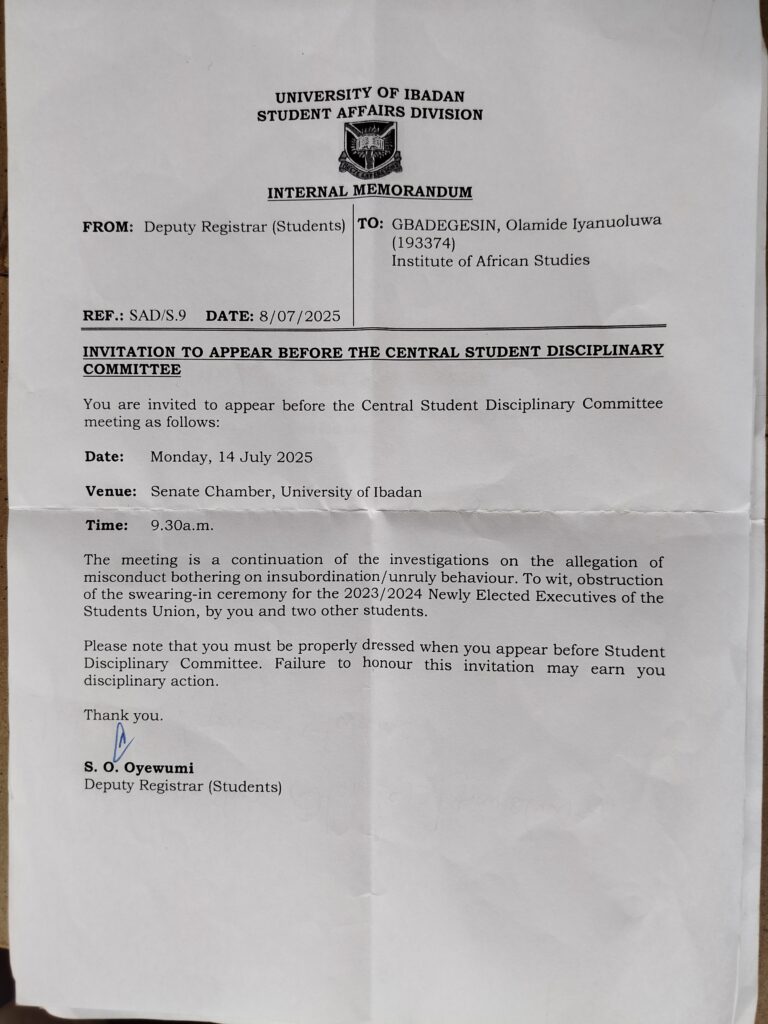
In an Internal Memorandum signed by the Deputy Registrar, Aduwo Ayodele and Olamide Gbadagesin are invited to appear before the Central Student Disciplinary Committee at 9:30 am tomorrow, Monday, 14th July. Failure to honour this invitation may earn them further disciplinary action.

